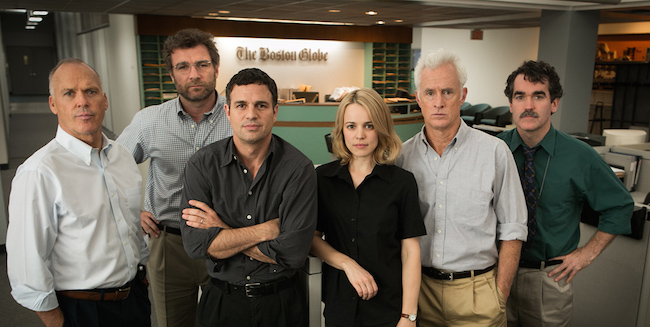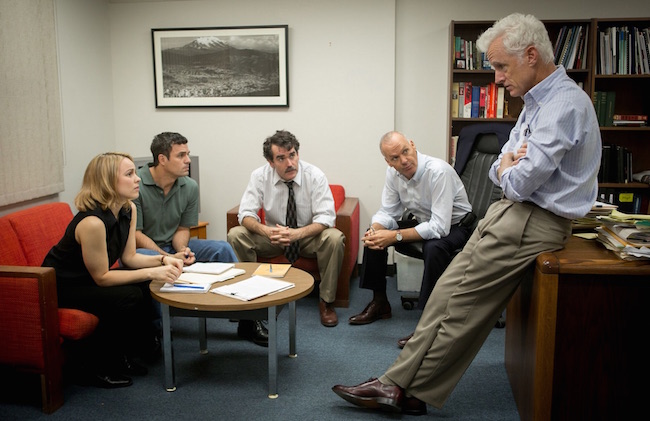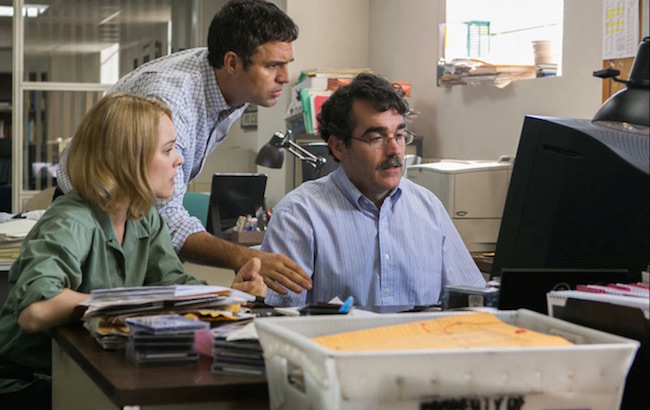
Think how often we hear a filmmaker say, “I just wanted to tell their story.” Usually this is at some sort of question and answer session in front of people who might potentially vote to award that filmmaker one of countless trophies. And then that filmmaker tells that same story to Jimmy Fallon later that week, then probably Charlie Rose the week after. This is all usually accompanied by a clip from that filmmaker’s new movie — probably a scene in which the protagonist looks triumphant as the music swells. Or maybe our main character is yelling. He’s probably yelling about something righteous. This is an “Oscar” scene. This is an “Oscar” movie. And this is all the usual garbage we have to put up with while that filmmaker makes his or her play for that Oscar.
Cynicism aside, filmmakers often have a problem with falling in love with their subjects, especially if that subject is still living and breathing. It’s human nature to trust that the person they’re making a movie about is telling the whole story… this isn’t journalism. But what happens when a filmmaking team doesn’t just take its protagonists’ word for it? What happens when these filmmakers dig deeper than the word of a group of journalists responsible for one of the greatest reported stories of the 21st century? Surely, if anyone were going to give you the full story, it would be this group, right?
That’s what makes Spotlight so remarkable.
I met Josh Singer — one half of Spotlight’s screenwriting team (director Tom McCarthy makes up the other half) — for coffee in Manhattan’s East Village. It’s a brisk evening and we have difficulty finding a coffee shop that isn’t packed. We settle on one, but Singer isn’t happy. He likes the coffee at the location we just left, but my fears of only hearing “crowd noise” on my recorder win the argument. Singer is quite tall and, when he gets going, kind of sounds like Adam Carolla, which makes him look a little bit like Carolla, too. Adding to this, Singer has a tendency to stop mid-sentence and proclaim, “Look, here’s the thing…”
Spotlight premiered in September at the Venice Film Festival, then ran the gauntlet through the Telluride Film Festival and the Toronto Film Festival, picking up almost unparalleled praise at each stop. Singer has taken this festival route once before – with 2013’s Julian Assange biopic, The Fifth Estate — but that experience had, let’s say, a lot more turbulence.
“Two years before, we had the same location for the party for The Fifth Estate,” Singer is talking about Toronto’s Soho House, which hosted the premiere party for both The Fifth Estate in 2013 and Spotlight in 2015. “There were a lot more people who wanted to talk to me at this year’s party.”
Spotlight is the story of The Boston Globe’s landmark story about abuse by Catholic priests against children and the Church’s systematic cover-up of these abuses. It’s a landmark story, one of this century’s defining pieces of journalism. As a film, though, it presented some logistic problems, namely how to cram the story of six separate journalists into one two-hour film and do everyone involved justice.
Singer’s initial idea involved “collapsing” characters into one another, something that happens quite often in biopics. In last year’s The Theory of Everything — which won Eddie Redmayne an Oscar – Stephen Hawking had a roommate named Brian. Instead of creating multiple characters to play Stephen Hawking’s Cambridge classmates, “Brian” was created to just represent all of them. Sometimes this is necessary, but as Singer remembers, McCarthy wasn’t having it.
“I was like, ‘How are we going to make four reporters work? Clearly we’re going to have to collapse a couple of characters,’” recalls Singer. “Tom was like, ‘No, we’re not going to do that.’”
McCarthy concurs with that telling, adding, “I think, early on, I just had an instinct that if we could pull it off and really committed to the true ensemble nature of the investigation, as relayed to us, it would make this movie feel original and provide a compelling energy to it.”

One of the most dramatic scenes in Spotlight occurs when a reporter named Matt Carroll (Brian d’Arcy James) realizes that a sort of halfway house for disgraced priest — basically, a nondescript house where the Church would send its accused priests to live until they were eventually reassigned — was just down the street from where he and his family live. Carroll runs out of his house to check just how close this house is to his own home – then returns, taping a sign on the refrigerator warning his children not to go anywhere near that house. It’s a powerful scene.
“Here’s the bad version,” Singer smiles. It’s worth that smile, because he knows the bad version only exists in his head. He continues, “The bad version is we decide instead of having Matt Carroll and Mike Rezendes, we have one character. We collapse those two characters and that one character has kids, so it’s Mike Rezendes doing that.”
Mike Rezendes, played by Mark Ruffalo, is, until that point, arguably the main character in Spotlight. If Spotlight were a fictional film, of course this scene belongs to the lead character played by a famous movie star, not a character that, up until this point, we hadn’t gotten to know very well.
“I understand the instinct to give it to Mike,” says McCarthy. “At that point, we were putting a lot of weight on that character.”
“At one point, my wife said, ‘That should clearly be Mike’s scene,’” remembers Singer, whose wife, Laura Dave, is a novelist. “But it didn’t happen to Mike; it happened to Matt.”
“Both Josh and Tom did prodigious research,” says Marty Baron, currently the executive editor at The Washington Post who served as editor of The Boston Globe during this story (and is played by Liev Schreiber in the film). “They interviewed us seemingly without end, and they spoke with an enormous number of others at the Globe, within the community, and in the wider world of experts. They reviewed all the emails they could get their hands on. They examined every court document. They read the full array of newspaper stories going back to the ’90s.”
This raises a question: Could Spotlight, a movie about one of the greatest examples of journalism in the last 20 years, itself be an act of journalism?
Before that question is answered, let’s examine one specific scene in the movie — a pivotal scene that I’ve seen result in gasps from the crowd — that no one on the Spotlight team had given McCarthy or Singer.
Eric MacLeish (played by Billy Crudup) is an attorney who specialized in backroom settlements with the Catholic Church, which usually involved a quick amount of money given to the victim in exchange for the victim’s discretion. Spotlight does not portray Mr. MacLeish in the best light.
“I didn’t want to talk to Eric MacLeish,” recalls Singer. “Tom was like, ‘Eh, let’s go see what he looks like.’”
McCarthy adds, “We were on the fence on whether we would talk to him, if he’d cooperate and what his attitude would be, we just didn’t know.”
Says Singer, “And I, at that point, had thought, This is a pretty bad guy. He just settled these cases in private. I was not interested in him.”
Says McCarthy, “And we thought, Well, let’s give everybody a shake here.”
And then the whole story that McCarthy and Singer thought they knew became something else. Singer explains, “We go sit with him and he spins us a little bit, but then he says, ‘I sent them a letter. And they published it, but they buried it.’”
McCarthy adds, “It certainly didn’t vibe with our research up to that point, so we had our doubts. Keep in mind, we’d been on this story for a year and a half, and he suddenly threw out a date and a number of priests that didn’t make sense to what we had.”
What MacLeish had told McCarthy and Singer is that he had sent a letter to The Boston Globe almost a decade before about all of this, including a list of priests. As a result, The Boston Globe ran a small story, which was printed deep into the paper and garnered little attention.
Singer found the article in question, “We sort of walked out, looked at each other, and said, ‘Bullshit.’ We went and checked the archives and we found it.”
This information, which is a key moment in the film, wasn’t handed to them. There was no source material. No one at The Boston Globe told them about this. They got this information from someone who both McCarthy and Singer had extreme reservations about.
“Look, I think you’ve got to be lucky and I think we were good to go sit with MacLeish, and it paid off,” says McCarthy. “We got lucky. He gave us a little extra. And that extra played perfectly into what we were doing with the movie. Yeah, that’s just one of those breaks.”
Did McCarthy feel like a journalist himself, cracking this part of the story open? “It was a really interesting moment, and it did sort of get that same buzz I think journalists get as a story starts coming together and new doors start opening. It certainly happened with the Spotlight crew a lot more than it happened with us, but I think we got a little sense of that thrill.”
And then there’s Phil Saviano (played by Neal Huff), a victim turned activist. Singer remembers, “He gave me a letter he sent in 1997. He wouldn’t tell me who he sent it to. He literally cut out the name. But it was a letter detailing priests in Worcester and priests in Boston. He had specifics — not followed up on.”
Says Singer, “All throughout the writing process, we were always writing toward ‘Was The Globe complicit in any way?”

But, again, that’s what’s so remarkable about Spotlight. McCarthy and Singer weren’t interested in just telling the story from the perspective of The Boston Globe. It’s not just their story. It’s the story.
Another aspect McCarthy and Singer were careful to avoid was the overly dramatic “Oscar moment.” There is one scene, about two-thirds of the way through the movie, where Mark Ruffalo’s Mike Rezendes gives an impassioned newsroom speech about why they should run with the story right now. We will see this scene a lot during awards ceremonies. What makes this scene interesting is a) Rezendes doesn’t get his way, b) he’s later proven wrong and c) this is the only moment in the whole movie that’s like this.
Singer laughs as he explains, “You know, it’s funny, in a normal movie, you’d have 10 scenes like that. And the studio would mandate it.”
Though, Singer does admit that a couple of times he wrote, what McCarthy called, “movie lines.”
“Tom would make fun of me because, occasionally, I’d write these movie lines. Some of them made it into the movie and some of them didn’t.” Singer recalls one example “Robby [Michael Keaton] has an interaction with Pete Conley [Paul Guilfoyle] at the bar. Which, I love that scene. Towards the end of the scene where Conley is pressuring Robby, Robby says, ‘So this is how it happens, guy leans on guy and suddenly the whole town is looking the other way.’ I wrote that line, which I was happy with. And then Conley comes back and I have Robby say, “You’re going to give me that!!!!” And Tom basically pared that, ‘Okay, guy leans on guy, that’s pretty good, but…’”
McCarthy defends his co-writer’s self-deprecation, “In hindsight, it’s easy to do, but we are all guilty of writing and overwriting. Sometimes that’s what a co-writer is for, ‘No, you’ve already got it.’”
Was there any time Singer knew he had something good here with this script? “I’m a Jewish neurotic, so no.”
When I present the idea of them getting the facts of this story as accurate as possible, coupled with the amount of research involved — that this all sounds like journalism, too, at least compared with other narrative movies — McCarthy poo-poos that idea a bit, “I think what we put down on paper, ultimately, what I captured in performance and what the actors gave us in performance represents maybe a little closer to the truth, as relayed to us. Of course there are different ways to tell stories, ours tried to make it authentic as possible.”
When I bring up the idea to Singer that maybe Spotlight itself works as a piece of journalism, he says, “That’s about the highest praise we can get. There was no book, there was no source material. And we didn’t get everything from the reporters, because we can’t.”
When I ask Marty Baron this question, he said, “In a movie, you have to use dialogue and scenes to introduce characters, make key points, and emphasize broader truths. This isn’t a documentary. It’s a movie. But it’s a movie that’s remarkably authentic and true to the broad outlines of how the story unfolded, the context of the times, and the larger themes that emerged over the course of the Globe’s investigation.”
Yes, it’s still a movie. But, dammit, if McCarthy and Singer didn’t do something special with Spotlight. It may not be journalism in the sense of what the actual Spotlight team did, but what they did is certainly something that we don’t usually see from a narrative feature film.
As McCarthy puts it, “Look, are we spot on? Is it a piece of journalism? Is it a documentary? No. It’s still a movie. But we did our best to the spirit of that investigation.”
Mike Ryan lives in New York City and has written for The Huffington Post, Wired, Vanity Fair and New York magazine. He is senior entertainment writer at Uproxx. You can contact him directly on Twitter.






